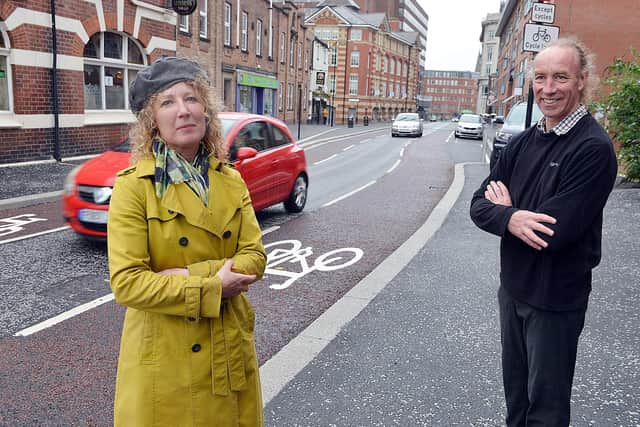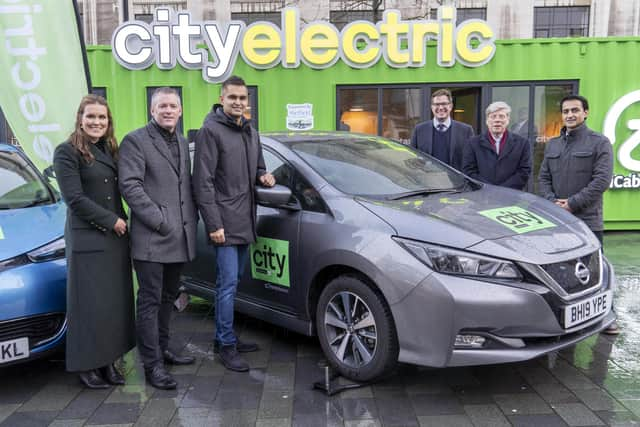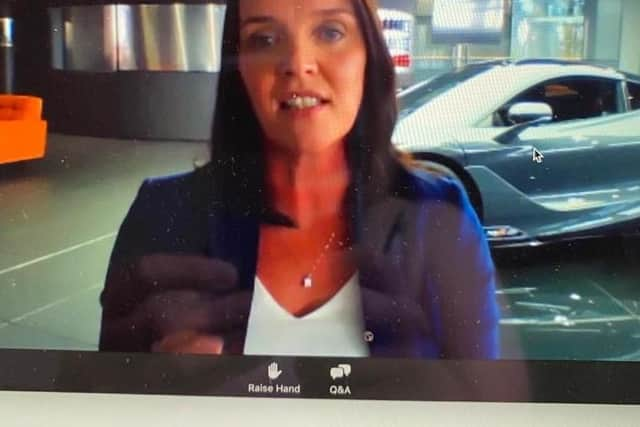More cars 'not the answer to anything' say Greens after government announces petrol and diesel ban
and live on Freeview channel 276
In 10 years' time, driving into the city will feel no different to today if no other action is taken - and pollution might be only marginally reduced, according to Coun Douglas Johnson, leader of the party in Sheffield.
He was responding to Prime Minister Boris Johnson announcement that new cars and vans powered wholly by petrol and diesel will not be sold in the UK from 2030.
Advertisement
Hide AdAdvertisement
Hide AdIt is part of a £4bn plan for a ‘green industrial revolution’ set to include £1.3bn for electric vehicle (EV) charging points and £582m grants for EV buyers.


Coun Johnson said any investment in green technology was to be welcomed but more cars ‘weren’t an answer to anything’.
Sheffield is a long way behind other cities on charging points - just 97 at the start of April according to DfT - and would need thousands.
He was disappointed there was no mention of ‘low and no’ pollution transport - cycling, public transport and walking - in the PM’s announcement.
Advertisement
Hide AdAdvertisement
Hide AdAnd he was concerned there would be a run on fossil fuel cars over the next decade as manufacturers sold them off cheap, while grants would benefit the affluent who could afford to buy new.


Finally, he feared it would encourage the city council to continue to delay the Clean Air Zone which was supposed to bring pollution below legal guidelines but was shelved due to the pandemic.
He added: “It’s a useful announcement that will kickstart investment, especially in charging points. A lot can be done in 10 years. But just switching is no answer to the big problems of congestion, road safety, parking and pollution from particles and dust off brakes and clutches.
“The key to the future is reducing the number of vehicles in cities regardless of the fuel source. £12bn sounds like a lot but it is only the same as the Serco contact tracing programme.
Advertisement
Hide AdAdvertisement
Hide Ad“The money would be far more cost effective if it were spent on cycling, e-bikes and walking. You don’t need to reinvent anything. The solutions are there already and they are cheap.”


Sheffield City Council aims to instal 48 rapid chargers within the next 12 months, according to Bob Johnson, cabinet member for sustainability and transport.
And they hoped to strike commercial deals for charging points.
He added: “A number of companies have come forward and I’d like to think we could quite quickly ramp up installation. We are never going to be able to do it on our own.”
Advertisement
Hide AdAdvertisement
Hide AdAnd he acknowledged the ban ‘would do nothing for congestion’.


Meanwhile, Sheffield’s biggest taxi firm, City Taxis, plans to have a fully electric fleet - 1,500 cars - by 2025.
Under the proposal, it would install up to 12 rapid-charging hubs in shipping containers around the city. The £120,000 units, charging up to 10 cars at a time, would also be open to the public and have wifi, a toilet and coffee facilities.
Earlier this year, supercar company McLaren unveiled a new carbon fibre chassis for its hybrid and electric supercars ‘entirely engineered, developed and produced’ at its £50m Composites Technology Centre on the Advanced Manufacturing Park in Rotherham.
Advertisement
Hide AdAdvertisement
Hide AdSpeaking at JPIMedia’s Great Northern Conference last month, Ruth Nic Aoidh, executive director of purchasing, commercial, government affairs and legal, said batteries were the future and they expected them to be good enough, in terms of performance and weight, to go into their supercars ‘within a decade’.
Dr Sol Brown of the University of Sheffield Energy Institute said ownership was set to ‘cascade’ out to ordinary motorists as confidence in them increased and the switch will be a ‘no brainer’ for many before the ban. The university was involved in a global effort to improve battery technology, he added.
On David Walsh’s LinkedIn page, Matt Spivey said: “Ten years is a long, long time in terms of tech. The batteries will be there. Our record on rolling out infrastructure isn't so good though. By the time we implement anything major that's tech related, it tends to be obsolete.”


Sam Schofield said: “Second hand combustion engines will still continue to change hands for the foreseeable future and the majority of cars on the roads will still be using petrol and diesel for quite some time after 2030. But it is a big change, brought forward by 10 years, as originally the ban was set for 2040.”
Advertisement
Hide AdAdvertisement
Hide AdRichard Halstead said: “Duties on petrol and diesel add up to almost £28bn a year for the exchequer, not to mention the VAT receipts, so how do they intend to plug the gap? Also how do they plan to make electric vehicles more affordable and how will they support the infrastructure changes needed. Those are big challenges in only a 10 year horizon.”
Martin Greig said: “Been driving an EV to and around Sheffield for a couple of years now. Charging infrastructure is nowhere near good enough. And it's too fragmented, dominated by different providers who insist you sign up to their and join their scheme.
“But the biggest challenge is to the car industry to produce EVs that are attractive and affordable. Too many are £50,000 plus. These are just electric toys for those who can afford them.”
Samantha Dixson added: “I bought a PHEV in the summer. Love the car but was disappointed when we drove down to Devon at how difficult it was to charge. The fourth service station we stopped at was the only one which had a charging point which was available/ working/ compatible. A government-led plan, backed by investment, is needed to ensure that electric driving is sustainable not something you have to undertake with your fingers crossed.”